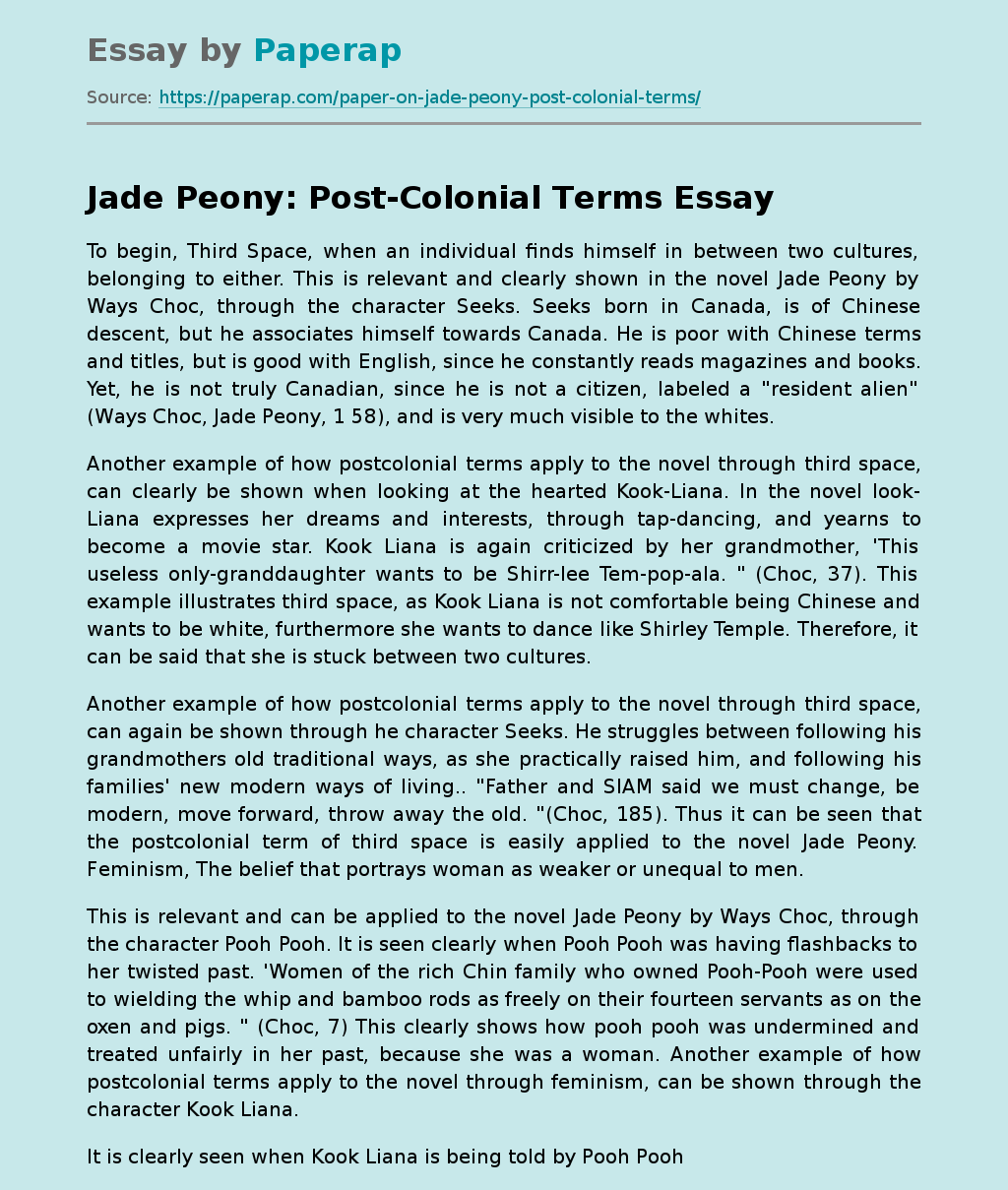Use of Postcolonial Terms in the Literature
The following sample essay on Use of Postcolonial Terms in the Literature discusses the use of postcolonial terms in some novel such as Jade Peony.
To begin, Third Space, when an individual finds himself in between two cultures, belonging to either. This is relevant and clearly shown in the novel Jade Peony by Ways Choc, through the character Seeks. Seeks born in Canada, is of Chinese descent, but he associates himself towards Canada. He is poor with Chinese terms and titles, but is good with English, since he constantly reads magazines and books.
Yet, he is not truly Canadian, since he is not a citizen, labeled a “resident alien” (Ways Choc, Jade Peony, 1 58), and is very much visible to the whites.
Another example of how postcolonial terms apply to the novel through third space, can clearly be shown when looking at the hearted Kook-Liana. In the novel look-Liana expresses her dreams and interests, through tap-dancing, and yearns to become a movie star.
Kook Liana is again criticized by her grandmother, ‘This useless only-granddaughter wants to be Shirr-lee Tem-pop-ala. ” (Choc, 37). This example illustrates the third space, as Kook Liana is not comfortable being Chinese and wants to be white, furthermore she wants to dance like Shirley Temple. Therefore, it can be said that she is stuck between two cultures.
Another example of how postcolonial terms apply to the novel through third space, can again be shown through his character Seeks. He struggles between following his grandmothers old traditional ways, as she practically raised him, and following his families’ new modern ways of living.
“Father and SIAM said we must change, be modern, move forward, throw away the old. “(Choc, 185). Thus, it can be seen that the postcolonial term of third space is easily applied to the novel Jade Peony. Feminism, The belief that portrays woman as weaker or unequal to men.
This is relevant and can be applied to the novel Jade Peony by Ways Choc, through the character Pooh Pooh. It is seen clearly when Pooh Pooh was having flashbacks to her twisted past. ‘Women of the rich Chin family who owned Pooh-Pooh were used to wielding the whip and bamboo rods as freely on their fourteen servants as on the oxen and pigs. ” (Choc, 7) This clearly shows how pooh pooh was undermined and treated unfairly in her past, because she was a woman. Another example of how postcolonial terms apply to the novel through feminism, can be shown through the character Kook Liana.
It is clearly seen when Kook Liana is being told by Pooh Pooh that she is “useless” (Choc, 32) because she is a woman. Do not be born a girl-child” (Choc, 27). This point shows Kook Liana being discriminated against as she is female, because within the Chinese culture it is said that women are weak. Another example of how postcolonial terms apply to the novel through feminism, can be shown through the character Stepmother. It is clearly seen regarding the issue of her children calling her Stepmother in replace of the mother. “She must have cast a glance at the Old One and decided to build her time. (Choc, 6). This shows that she did not intentionally let her children call her Stepmother, but involuntarily operated to follow the Old Chinese traditions, even though two of the children were her own biological. Thus, it can be seen that the postcolonial term of feminism can easily be applied to the novel Jade Peony. Normalization, an action by means of which the dominant group rejects the minority. This is relevant and can be applied to the novel Jade peony by Ways Choc, through the effects of World War Two on the conflict between the Chinese and Japanese.
For example, when the writer says “Gangs of older, jobless boys roamed back Streets hunting for Japanese. (Choc, 196). Through this point It can clearly be seen that the war influences normalization. Young boys are being taught to hunt down Japanese for no apparent reason, teaching cultural bias and normalization from a young age. Another example of how postcolonial terms apply to the novel through normalization, can be shown through the character Seeks. It is clearly seen when Seeks explains how Chinese people are marginalia by employers solely because they are Chinese.
Only because Canadian citizens could qualify as professionals. If you were Chinese, even if you were born in Canada you were an educated alien. ” (Choc, 158). Meaning that no matter how hard you may try to assimilate into society you will never have the same opportunities as others of the country race. Another example Of how postcolonial terms apply to the novel through normalization, can be shown through Meaning and her relationship with Kazoo. It is clearly seen through when Seeks explains that Meaning and Kazoo relationship is secret as Kazoo is Japanese and Meaning is Chinese. Meaning and I never once openly discussed tit each other the understood and forbidden topic of her sneaking around to visit her boyfriend. ” (Choc, 259) ‘But he was, after all, still a Jape. ” (Choc, 259). These quotes clearly show that the couple was marginalia by both Chinese and Japanese as it was forbidden to even think about having a relationship with a Chinese and vice-versa. Thus, it can be seen that the postcolonial term of normalization can easily be applied to the novel Jade peony.
Use of Postcolonial Terms in the Literature. (2018, Mar 28). Retrieved from https://paperap.com/paper-on-jade-peony-post-colonial-terms/

